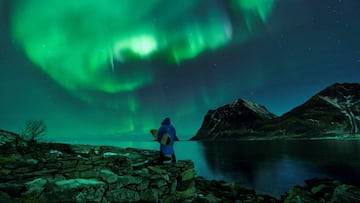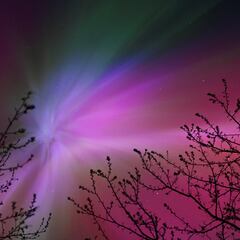What is an aurora borealis and why is this visual effect produced?
The natural phenomenon that lights up the night sky is usually only visible in more northerly countries, but could be seen from the US this week.


Parts of the United States could be in for a treat this week as aurora borealis, also known as the Northern Lights, could make a rare appearance in the skies on Tuesday night.
Explosions on the surface of the sun have sparked coronal mass ejections, sending clouds of charged particles into the solar system. These charged particles will light up the night sky and make the Northern Lights visible in mainland US.
Brian Lada of AccuWeather explains: “These clouds of particles are predicted to collide with Earth’s magnetic field on Wednesday night into Thursday, sparking dazzling displays of the aurora.”
What are the Northern Lights?
The term ‘aurora borealis’ means ‘light of dawn’ and is thought to have been coined by Galileo in 1623. The name comes from the words ‘Aurora’, the goddess of the dawn, and ‘Boreas’, which is the personification of the northern wind.
The Northern Lights occur when highly charged solar particles collide with particles in the earth’s atmosphere. Energy from the collision is transferred into light and creates the stunning show we can see from earth.
Turn your eyes to the northern sky overnight on Tuesday night. We may see the Aurora Borealis across Canada due to a solar storm sweeping past Earth.https://t.co/TLCTJ8aFim
— The Weather Network (@weathernetwork) July 23, 2024
The strongest magnetic fields on earth are found in the Polar Regions at the top and bottom of the planet, which is why the phenomenon is most clearly visible in areas close to there.
The lights at the South Pole are called aurora australis, but are generally only visible from uninhabited areas. In the northern hemisphere, the phenomenon is visible in the northernmost parts of Canada, Norway, Sweden, Finland, Alaska and Russia, and all of Iceland.
When can I see the Northern Lights in the US?
Related stories
Typically aurora borealis is only visible closer to the North Pole, in Alaska and Canada, but can sometimes be seen further south if the conditions are right.
Here’s a few tips to get the best view
- Try to find a spot with little or no light pollution
- Find a place with higher elevation
- Check whether your area is expecting cloud or precipitation, which could block the lights
- Don’t be confused by the name, the Northern Lights can appear in any direction
The Northern Lights are usually clearest under dark skies from August until mid-April. The phenomenon is most eye-catching on clear, cloudless nights and there is typically greater activity around the equinoxes, when there are exactly 12 hours of daylight and 12 hours of sunlight in a day.


Complete your personal details to comment